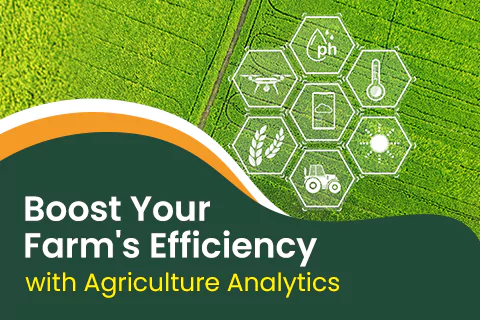In today’s times, the demand for food is increasing. This results in higher pressure on farmers to produce food. However, with limited resources and manual labour, more production can be challenging. Agriculture analytics is such a relief in such a situation.
Agriculture analytics is also referred to as “smart farming” or “precision agriculture”. It involves the use of sensors, data analytics and technology to make evidence-based decisions about resource utilisation, crop management, and overall farm operations. This can result in improved productivity and profitability.
Efficient Agriculture Analytics with Precision Farming
Precision farming is one way to change the whole process of farming. It has simplified agriculture analytics. Now, you can easily collect data from different sources with the help of tools like sensors, drones and the Internet of Things. Farmers can detect problems before they even occur and find suitable solutions for it. Hence, farmers can supply water, nutrients, pesticides, and manure as and when required, which can lead to reduced wastage of resources and maximum yield.
Additionally, agriculture analytics can monitor and detect the crop health in real-time. It can help in detecting irrigation issues or unequal distribution of water due to the help of thermal imaging. This enables the farmers to detect early signs of crop stress and diseases before they turn into a serious disease. It will help in reducing potential damage to the crops.
Smart Machinery and equipment
Agriculture analytics is important in agriculture not only because it helps detect and provide timely resolution to crop disease and thermal imaging. But also because it helps revolutionize farm machinery and equipment. With the help of advanced sensors and telematics systems, farmers can know about the maintenance required by the equipment and machinery as it can monitor operational efficacy and equipment performance. Hence, it reduces fuel consumption and increases machinery uptime, resulting in overall productivity.
Data optimisation for smart Farming
Agriculture analytics enables data-driven analytics to make decisions at every level of farming. This data can help optimize resource utilization, enhance farm productivity, and improve crop rotation facilities. This helps in guiding a farmer from field-level management to strategic planning. It leads to continuous improvement and innovation in agriculture.
Predictive modelling
Predictive modelling is another key component of agriculture analytics. As the name suggests, it helps in forecasting future outcomes and trends with the help of historical data and machine learning algorithms. For instance, it can help farmers to decide about the crop selection, planting schedule and marketing strategies by anticipating crop prices, weather patterns and market demands. It enables farmers to minimise the risk and improve their competitiveness in the market.
Despite agriculture analytics’s advantages to the farming industry, a few challenges need attention. Many farms need more resources and infrastructure to collect and analyse the data. Hence, the availability of quality data is one of the primary challenges in many areas. Furthermore, farmers need to ensure that the data is safe from all unauthorised access and misuse. Hence raising an important question of data privacy.
Promising Future of Agriculture Analytics
However, with all the possible challenges, agriculture analytics still holds a very promising future worldwide. Therefore, the government, technology companies, and agricultural organisations are promoting the adoption of analytical farming. They are also investing and promoting research to develop it and overcome the barriers it poses. With the help of training, education, and support initiatives from government and agricultural organisations, farmers can learn the importance of agriculture analytics. They will learn how to use the data efficiently and effectively to enhance operations, achieve increased profits, and reduce wastage.
This will help enhance crop management, productivity, profitability, machine performance and optimum use of resources. Hence, farmers can achieve a new level of success with technology driven decision making.

